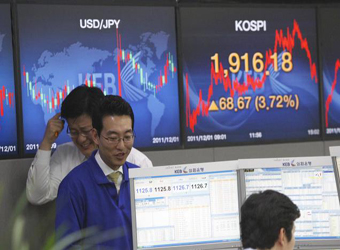Asian markets traded mostly higher on Tuesday as dollar prices nursed overnight losses. Japan’s Nikkei 225, which had earlier hovered near the flat line, rose 0.55 percent late in the morning.
Subaru advanced 2.59 percent to outperform its peers. The company said it expected sales stateside to increase by 5 percent this year to 680,000 vehicles, the Wall Street Journal reported Monday. Other Japanese automakers were mostly higher: Toyota added 0.82 percent and Honda tacked on 0.15 percent.
Across the Korean Strait, the Kospi erased early losses to climb 0.19 percent as index heavyweight Samsung Electronics rose 1.36 percent. Rival chipmaker SK Hynix also recorded gains, climbing 0.96 percent. Automakers also rose as the session progressed, with Hyundai Motor adding 1.29 percent.
Brokerages and manufacturing names, however, traded lower on the day.
Down Under, the S&P/ASX 200 slipped 0.23 percent as the energy, utilities and telecommunications sectors led losses on the broader index. The heavily-weighted financials sector declined 0.27 percent.
Rio Tinto shares declined 0.42 percent, paring earlier gains made after it reported fourth-quarter production figures. The company said 2017 iron ore shipments rose 1 percent and were in line with guidance. Fourth-quarter iron ore shipments rose 3 percent compared to the same period one year ago. The Hang Seng Index bounced 1.09 percent after ending a 14-day winning streak in the last session. Index heavyweights Tencent and HSBC were up 2.4 percent and 0.3 percent, respectively, as financials, casinos and energy-related plays notched gains.
The Hang Seng Index bounced 1.09 percent after ending a 14-day winning streak in the last session. Index heavyweights Tencent and HSBC were up 2.4 percent and 0.3 percent, respectively, as financials, casinos and energy-related plays notched gains.
On the mainland, the Shanghai composite edged up 0.41 percent and the Shenzhen composite rose 0.683 percent. Despite the broader move higher, airline stocks suffered steep losses in the morning, with Air China falling 3.73 percent and China Eastern Airlines losing 3.39 percent.
MSCI’s index of shares in Asia Pacific excluding Japan gained 0.33 percent after notching a fresh record high in the last session.
Dow Jones industrial average futures, meanwhile, soared 0.67 percent, or 173 points, ahead of markets stateside re-opening following Martin Luther King Jr. Day on Monday.
European markets finished in mildly negative territory in the last session, although volumes were lighter than usual owing to Wall Street being closed.
The dollar nursed losses after extending its broad declined overnight even though U.S. markets were closed. The dollar index, which tracks the U.S. currency against a basket of six peers, traded at 90.478 at 10:40 a.m. HK/SIN after falling as low as 90.279 on Monday.
“Holidays typically mean consolidations but today, less participation from the U.S. translated into exaggerated moves in currencies driven by low liquidities,” Kathy Lien, managing director of FX strategy for BK Asset Management, said in a note.
The dollar edged up against the Japanese currency to trade at 110.83, above Monday’s close of 110.52.
Meanwhile, the euro held onto overnight gains made as the greenback sank in the last session. The common currency traded at $1.2278 after climbing as high as $1.2296 on Monday — its highest levels in three years.
The on-shore yuan traded at 6.4235 to the dollar and the offshore yuan traded at 4.4273 at 10:45 a.m. HK/SIN after the currency rose to its strongest levels in two years on Monday.
The People’s Bank of China earlier fixed the official midpoint at 6.4372 a dollar, the highest reference point in more than two years, Reuters reported. China’s central bank allows the yuan to move 2 percent higher or lower against the dollar, relative to the fixing rate.
On the energy front, U.S. West Texas Intermediate rose 0.5 percent to trade at $64.61 per barrel after touching three-year highs on Monday. Brent crude futures were lower by 0.23 percent at $70.10.
Baidu’s video-streaming platform iQiyi has confidentially applied to potentially list stateside, Thomson Reuters publication IFR reported on Monday, citing sources. The deal, which could potentially raise around $1 billion, is expected to take place late in the current quarter or in the second quarter, IFR added.
The latest news came hot on the heels of earlier headlines that other Chinese companies, including online finance platform Lufax and smartphone maker Xiaomi, were looking into initial public offerings of their own, most likely in Hong Kong.


